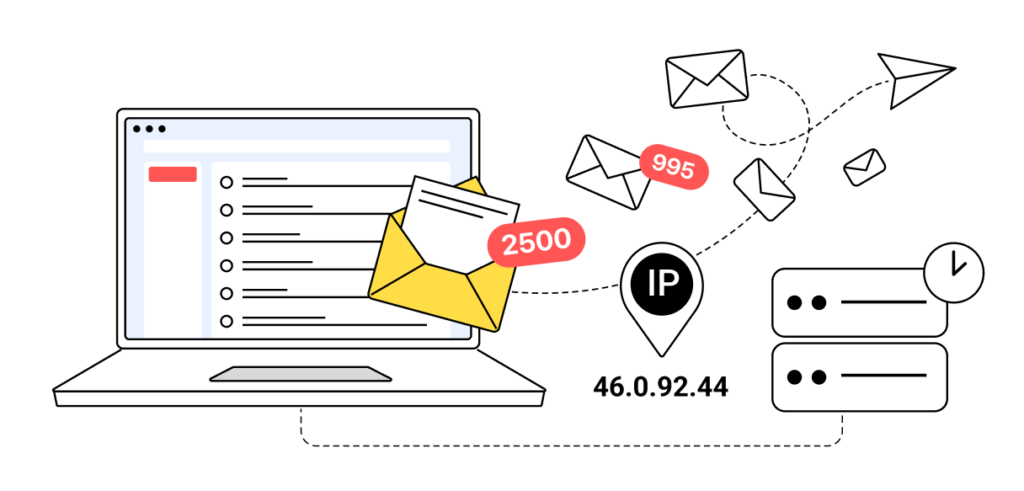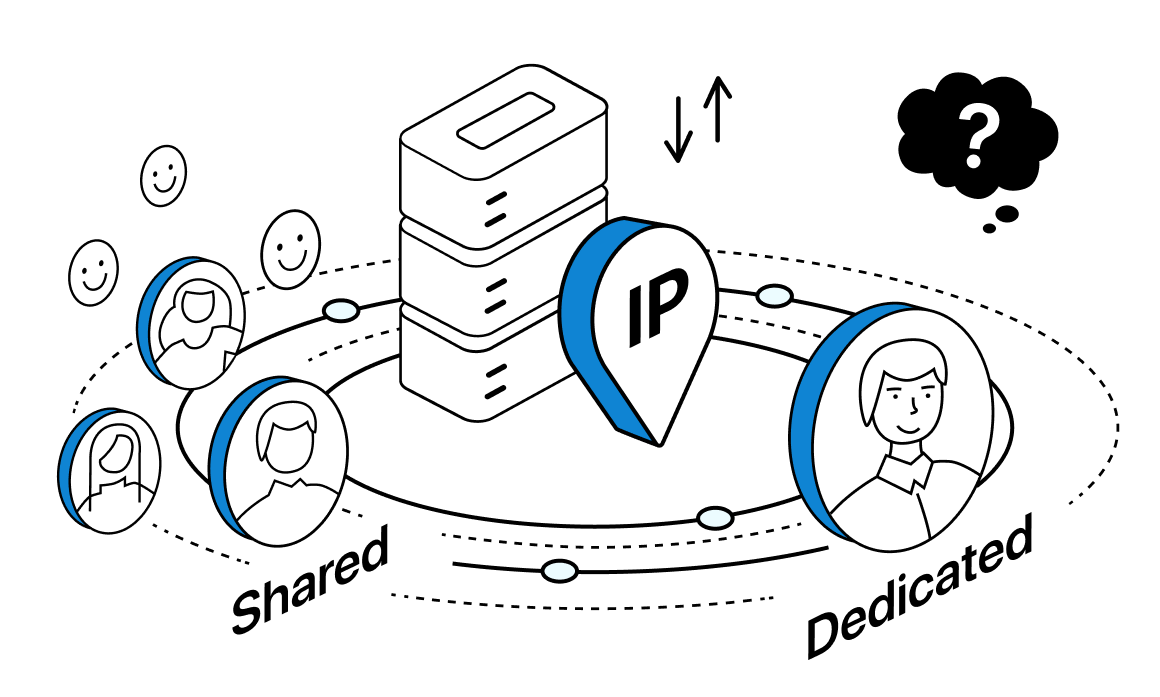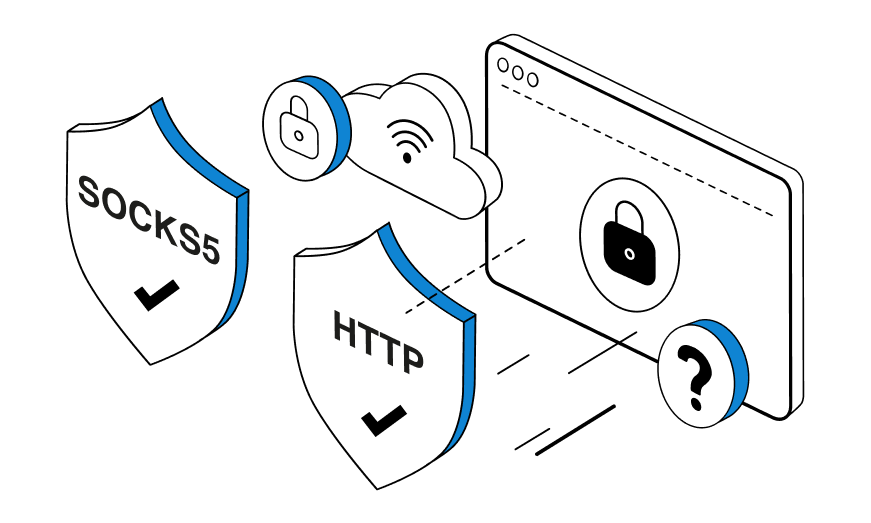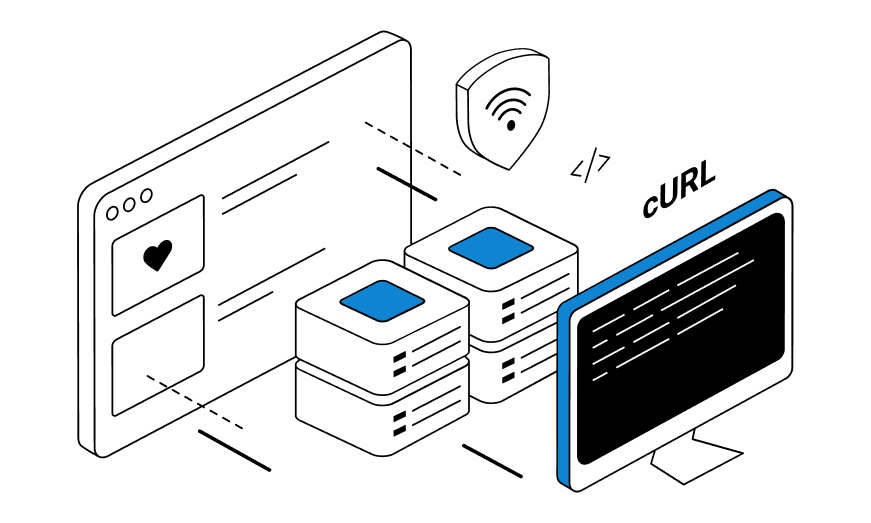When it comes to using shared vs dedicated comparison, there are a lot of subjects we can touch upon here from handling emails to using different types of proxies for various scenarios.
In order to shed maximum light on the matter, we suggest starting from the very basics and talking about IPs themselves: what they are and what they are used for. With that in mind we will cover the most common cases where it is essential to differentiate digital services by the type of IP: dedicated vs shared IP.
Of course, deducting from the name, we can guess the main difference between shared IP and dedicated IP addresses. But what does it really mean for the user? When is it safe for instance to use proxies with shared IPs? After reading this article, you will have a much better answer to all these questions.
What is an IP Address in General?
So, now it’s time to get the basics straight. An IP stands for Internet Protocol. So, when we are talking about an IP address, we refer to a string of four numbers (each from 0 to 255) separated by periods (e.g. 250.190.140.58). Now, this number is used by your Internet Service Provider (ISP) to assign you an identifier in the realm of the Internet.
So, each time you go online, your ISP gives you such a number to be able to operate online. And when you open your browser and ping a website, a request is sent with your IP address to get you the requested page in return.
What is interesting to note here, is that you can alter your IP address by using proxies or VPN services to mask your presence (or your real IP) for the site you are accessing.
What is also worth mentioning in this respect is the DNS or Domain Name System. Think of it as the Internet phone book that contains all the names of websites with their respective IPs. This is done for an obvious reason, so that you do not have to memorize numerical combinations for the websites that you need but instead could use simple memorable names of the same sites.
So What is a Dedicated IP Address?
To give you a brief and straight answer to the question we can say that a Dedicated IP Address is an IP address that can be used solely by you.
So, if we are talking about emailing services, it would mean that all your messages will be sent exclusively from a single IP assigned to you (as Plesk administrator, or email service customer). You will be in control of the inbox placement, deliverability and reputation related to the emails sent from this IP.
And in the realm of proxy servers, dedicated IP proxy means that you will be the sole user of this proxy IP address. No one at any time will be able to use it and access other sites out there under this IP.
So What is a Shared IP Address?
And, as you may guess correctly the opposite will be true about the shared IP address.
In the case of email services you will be sharing the same IP with other users. What it will mean for you is that you will not have total control over reputation and deliverability of the emails. Most likely, you will be grouped with other businesses while you send emails.
With proxies it means that the same IP address may be used by another user of the same company while it is not in use by yourself. It may increase the risk of such cooperative use of the server.
Using Dedicated IP vs Shared IP in Email and Hosting Services
Dedicated IP vs Shared IP for Email

If your business is tasked with sending thousands of emails advertising your products, you should consider doing it through a special service that will provide a dedicated solution for such a mailing server.
But what are the real advantages of using dedicated IP for emails?
High volumes. Most importantly a dedicated IP will allow you to keep the volumes of your emails at a very high level without risking the reputation of your site’s IP.
No risk of bad reputation. In case of shared IPs, you will also be codependent on the reputation of your partners using the same IPs for emailing. It may get poorly reflected on your emails if something goes sour with their mail.
It’s worth the money. With dedicated IP you will be able to maintain a track record of your emailing. Your control over the reputation will be able to pay for itself in the long run.
Now, in what situations should you go for a shared IP for emails?
Low volumes. If you are a low volume sender of emails, it will make sense to use shared IPs. The emails from such IPs will be viewed as more “valuable” than from a static IP without any consistent track record of emailing.
Good reputation of IP partners. At earlier stages of your development you will be able to benefit from the established reputation of the IPs shared with your partners.
Low cost. Starting your emailing from a shared IP will likely be more cost-effective for you at an early stage than from a dedicated IP.
Dedicated IP vs Shared IP: SSL and Security
Now, when it comes to using SSL certificates in hosting websites that process financial or payment information of users until recently it was true that for obtaining such a certificate you needed to purchase a dedicated IP. And that has changed over the past decade.
Today we have SNI or Server Name Identification. It allows using multiple SSL certificates with the same domain name (or IP address). And the user is getting the certificate corresponding to the requested server name.
Having said that, you can feel safe while using shared IP for hosting websites from the SSL perspective and from the point of view of security concerns for the site.
When SSL is used in describing proxies, you need to remember that in this case people refer to Secure Sockets Layer protocol that these proxies run on. Such SSL proxies are more secure for preventing any leak of data running through them.
Dedicated IP vs Shared: SEO
Another interesting area to look at from the perspective of hosting using dedicated and shared IPs is SEO.
As surprising as it may sound, SEO was never revealed as to be affected by the type of hosting. It is confirmed by dozens of companies that are engaged in the industry. Experts claim basically one fundamental thing: your SEO entirely depends on the quality of texts you feature on your websites and not on the type of IPs you use for hosting this information.
Dedicated or Shared IP Host for Anonymity
You will likely require dedicated IP web hosting for maintaining anonymity of it. You will need to approach your hosting provider on how to ensure anonymity. Most likely you will be able to set up and monitor it through your single hosting account.
Dedicated IP vs Shared: Pricing
When we are talking about hosting a site with a dedicated or shared IP we need to take into account the length or such service and the price of a particular hosting provider.
Dedicated IPs normally are featured in more expensive hosting plans as an add-on and the total monthly cost of such plans can be anywhere between a few dozens to a hundred of dollars a month.
But avoid choosing the plan based solely on the price. Consider all hosting related aspects of your business before deciding on this issue.
Types of Proxies: shared vs dedicated, datacenter vs residential
Now, from the perspective of IP origination proxies are divided into two distinct subcategories: datacenter and residential.
Datacenter proxies are generally cheaper IPs that are supplied to a proxy provider by DCs thus revealing in their IPs their origin to the target site. Some sites are sensitive to IPs that don’t appear as legitimate users and may redflag activities from such IPs. Therefore, datacenter proxies are usually effectively used for less critical missions, like scraping information from generally accessible resources. In some cases, it is recommended to buy a rotating proxy that will have a special mechanism for changing your IP for every connection to the target for even more effective scraping.
Residential proxies, on the other hand, appear as regular users to a website. Such proxies are usually geo positioned (you can have a US residential proxy, for example), meaning that you can easily use such proxy IPs with sites that are sensitive to the state or city location of the end-user.
You can find more information on the difference between datacenter proxies vs residential proxies following this link.
Now, from the IP allotment perspective, proxies can be shared or dedicated.
In case of shared proxies, the same IP address can be used by multiple users, thus increasing the risk of revealing and banning the proxy.
And with dedicated proxy, such IP is assigned and can be used by a single user with less risks of being banned. So, going back to the geo IP origination, you can have a dedicated residential proxy or a dedicated datacenter proxy, depending on the type of IP.
What are the Advantages of Dedicated over Shared IPs When It Comes to Proxies?
Now that we have established the main difference between shared ip vs dedicated ips when it comes to proxies, and the fact that the proxies with shared IPs are used by multiple users and dedicated private proxies are in control by a single user, we have to ask ourselves the real question.
And the real question is to establish the cases where to use one or the other type of proxy and decide when the advantages of dedicated proxies outweigh the price issue involved here.
Advantages and Disadvantages of Dedicated Proxies
We can say from the get go, that there are three distinct advantages of dedicated proxies that can be summarized in three things: Performance, Control, and Security.
Performance. When it comes to speed, dedicated proxies are way faster than shared proxies for the obvious reason. You do not need to share the bandwidth of the proxy with anyone else.
Control. Why using a dedicated proxy you maintain total control over the proxy. What it means for you operating is that you simply avoid the risk of getting your IP banned due to some illicit activity on the part of your proxy co-owners.
Security. Buying a dedicated proxy from a reputable provider means that all your data transferred through such a server will be handled securely without any leaks to the third party. The same will be true about any of the personal information you reveal to the provider in the process.
The major disadvantage of dedicated proxies is their cost. Dedicated proxies are priced above shared IPs for an obvious reason: the proxy provider needs to allocate fixed IPs for your purposes without sharing them with other users.
Advantages and Disadvantages of Shared Proxies
Now, if we consider shared proxies, the main advantage here will be their price. We can also say that, from the business perspective, shared proxies can be perfect for scraping and parsing SERP results for SEO-related missions.
And the drawbacks here with shared proxies come from the nature of such IPs. First, your connection can be on the slower side since you will not be the only user of the IP. Secondly, the shared proxies are less reliable than dedicated proxies, meaning you have a higher risk of leaking the data.
Deciding on Using Dedicated or Shared Proxy IPs for Business
If your online mission demands high performance proxy servers with top reliability and total control over the IPs used in the process, we would certainly recommend you using proxies with dedicated IP. For less critical cases, you may as well consider buying more affordable shared proxies.
But the final choice of the type of proxies depends on the way you want to use the proxies. After consultations with your provider you can decide on whether to use shared or dedicated proxies and in some cases you can really save some budget on using less expensive shared proxies for your missions.
In terms of use cases where the use of dedicated proxies is justified we can certainly outline all sorts of online operations dealing with sensitive financial information. If you want to guarantee extra security or protection to your private network access, you can engage dedicated proxies to prevent hackers from gaining access to such vital information on your servers.
And as for shared proxies, the major areas of application here would be any online operations related to data mining and collection of sales intelligence. With data mining you can set up your scraper so that your requests will be evenly spread across many sites and they will fail to detect any proxy activity.
You can also engage shared proxies in online missions on social networks. Read this article to find out more on our best social media proxies and the use cases thereof.
And for sales intelligence with shared proxies you will be able to eliminate the “neighboring” effect of your scraping (when scraping is done just from IPs geographically close to the target servers) while collecting the information on the products from your competition. It will allow collecting more relevant data for further analysis.
Consider PrivateProxy Your Trusted Partner
As you may have understood from the text above, there are a lot of various areas of application of both shared and dedicated proxies. In some cases, the budget does not play as critical a part in the business equation as it may seem. You can easily start spending more than you should by investing in dedicated proxies or services where you could easily live with shared. The best way to resolve this is to avoid unnecessary mistakes in the first place. This is possible by doing business with reputable and reliable partners in this industry.
We are trusted by thousands of customers Worldwide also for the reason of our readiness to assist them with any proxy-related concerns around-the-clock. This surely includes the issues of picking the right proxies for your projects. We have built up a great deal of experience in all sorts of business case scenarios from the perspective of optimizing costs on proxies and are ready to share this information with you.
We are just a few clicks away. So, feel free to approach us anytime to choose the right proxies for your online business!
Final Thoughts
We hope that in this article we managed to shed more light on various types of information services from the perspective of using shared or dedicated IPs. We covered subjects related to hosting, organizing emailing and proxy servers. We debunked some myths and shared some insights along the way.
If you still have some questions as to what proxy server type will be right for you, you can always approach our account managers by using the intercom box in the right-bottom corner. It will be our pleasure to assist you in this matter.
Frequently Asked Questions
Please read our Documentation if you have questions that are not listed below.
-
Is it better to have a shared IP address or dedicated IP?
If we are talking about proxies with dedicated vs shared IPs, then this question will be entirely about your use case requirements. For scenarios where you will need fast performance and high security you might want to use dedicated proxies and for less critical missions (like scraping websites with general access) you can be OK with shared IPs. Again, in order to be more certain about the type of IP for your particular case, our tech support team is always online to give you proper advice.
-
What type of IP address is best for site security and performance?
In case of dedicated vs shared proxies, a dedicated proxy is considered more secure and highly performing than a shared proxy for the main reason of individual use of such a proxy by one user among other reasons covered in this article.
-
Do you need a dedicated IP for SSL?
Not anymore. Thanks to SNI or Server Name Identification you can have multiple SSL certificates with the same domain name (or IP address). In this case, the user will be getting a certificate corresponding to the requested server name.
-
Which IP is more secure: shared vs dedicated IP address?
You will have total control over your dedicated address, which will also mean a higher rate of security in this case. With shared IPs your security level is compromised by the number of users operating proxies with the same IPs.
-
Do I need a dedicated IP for shared hosting?
The question of using shared hosting vs dedicated IP can be easily resolved with your hosting provider. It is possible to have a dedicated IP on a shared server but you will need to approach your provider on how to arrange it.
-
Should I have a dedicated IP for my Minecraft server?
In most cases it is recommended, since it will reduce your problems while configuring the server with a unique IP that is known only to you.
Top 5 posts








A lot of times people tend to confuse web crawling with scraping. And, although these two activities are somewhat similar in nature there is still a significant difference between them that deserves an article in our blog to explain it in detail.